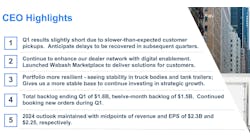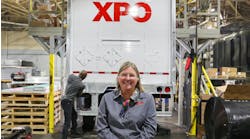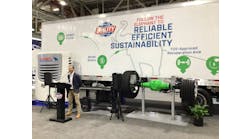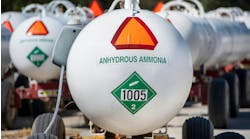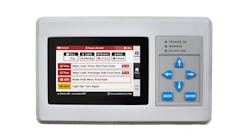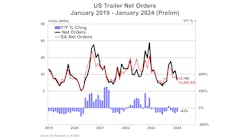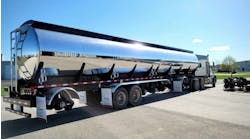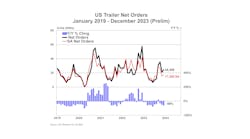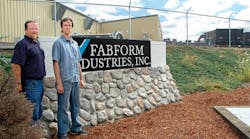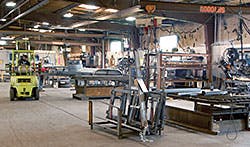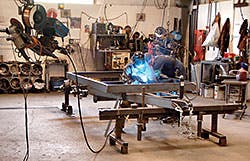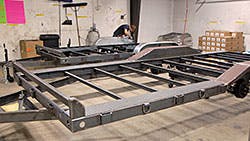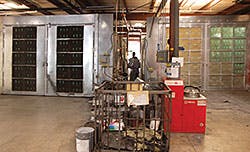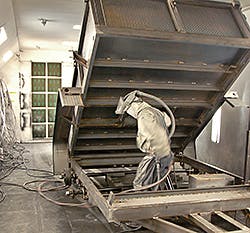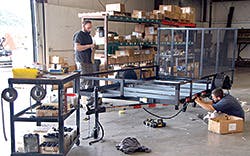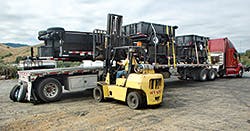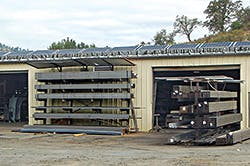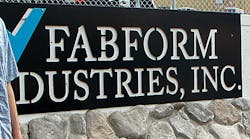When Brandon Ikola won the National Trailer Manufacturers Association’s Young Entrepreneur of the Year Award at this year’s NATM convention, it had to confirm his dad’s decision to turn day-to-day operation of his trailer manufacturing company over to his son.
Rob Ikola started Fabform Industries Inc as a custom manufacturer of light-duty open utility trailers in January 1992 when Brandon was seven years old. Even at that early age, he could see the company up close because it started inside the family horse barn.
In 2001, Brandon officially became an employee of Fabform at the age of 16, working for the company throughout his high school and college years.
“I worked my way through the business,” Brandon says.
In doing so, he reached the top. Four years ago Rob decided that Brandon was ready to run the operation. The dad gave his son the title of vice-president and general manager, along with the authority he needed to run it. With Brandon managing the trailer manufacturing company, Rob could then devote more time to another one of his businesses—a winery in the Roseburg, Oregon, area.
As Brandon grew, so did Fabform. The manufacturer quickly outgrew the horse barn and moved into a 3,000-sq-ft building of its own. That building became inadequate also, leading the company to move into a 15,000-sq-ft plant.
By 2013, Fabform had grown out of that building and into its current location. The 50,000-sq-ft structure had served as home for a jet boat manufacturer, but is now turning out an expanding line of light-duty trailers.
“We have been growing steadily—about 15-20% the last few years,” Brandon says. “That has been our plan—growth that we can manage.”
Making the transition
Working in the family business as a teenager is one thing. Running it is an entirely different matter. Starting at the bottom gave him a foundation, but his parents made sure that he mastered one position before being trained for another.
His dad taught him the finer points of operating the business, including designing trailers, manufacturing trailers, and purchasing the components needed to produce them. His step-mother trained him on the computer system, including payroll and paper flow. After graduating with a degree in business administration from Eastern Oregon University, Brandon began serving as general manager of operations.
When he became general manager of operations, Fabform had only 10 employees and was operating out of two separate locations. Since then, the company has moved into its current location, and it now employs 35 people.
While making the transition to the leader of the family business, Brandon also was attempting to lead the business to one of more growth and professionalism.
A strong next step
The Ikola family found a strong resource for that next step by attending the NATM convention in 2011. Albuquerque was the venue that year, and one of the speakers at the convention represented the New Mexico Manufacturing Extension Partnership.
Through that convention, the family identified a consultant who could guide the company through many of the hurdles that had to be overcome to transition a small family business to one that could operate at a larger scale.
In addition to the assistance provided by the consultant, the Ikola family has developed relationships with other, larger manufacturers who have also provided ideas that have helped Fabform grow.
Based on what he sees and what others have advised, Brandon has concentrated on three areas:
• Human resources. “Personnel is the most valuable resource a company has,” Brandon says. “We recognized that we needed to change the culture to one in which everyone values the idea of continuous improvement. We want each person to value themselves and to continually grow. And we want them to buy into a company that continuously improves. At the same time, we also had to accept the fact that we were transitioning from my dad and that I was now the one who would be in charge.”
Rob and Brandon addressed that issue simply. Rob called a companywide meeting at which he announced that Brandon would now be responsible for the daily operating decisions. Rob remained visible at the Fabform facility for about three months and then gradually dedicated himself fulltime to his vineyard.
• Production efficiencies. Brandon began implementing lean manufacturing concepts at Fabform. The first step was to clean the work environment. “We introduced 5S,” he says. “We put only the things in the bays that were required. We took photographs of what the bays should look like so that everyone can know what the ideal looks like—and maintain that ideal. We still have a long way to go, but we are off to a good start.”
• Green. Brandon evaluated energy consumption and implemented ways to reduce costs. The company took advantage of state and federal grants to install solar panels on the roof of the plant. The system produces between $700 and $800 per month in electricity. Grants also provided financial assistance to install energy efficient LED lighting throughout the plant.
Plant improvements
Other recent changes to the plant include:
• Addition of a new plasma table.
• Addition of a second paint booth. The company now has one 44-ft booth and has replaced its 28-ft-long booth with one that is 39 feet long.
“We needed additional paint capacity once we started building horse trailers,” Brandon says. “We were fortunate—our application was approved without any delays or difficulty.”
• Updated spray equipment.
• Bulk storage of welding gases. The manifold system includes a sensor that monitors the amount of gas contained in the central tanks. When the quantity drops below a defined level, it automatically sends an email to the gas supplier to restock it.
• Additional forklifts and ironworker.
Students become employees
Fabform may only have 35 employees, but the company is concerned about being able to hire more. To that end, Brandon has been working with local high schools and the community college to help educate students in the skills that a trailer manufacturer requires.
The programs give students real-world experience. For example, the company provides classes with raw materials and instructions for how to fabricate certain parts.
“We also have partnered with local schools to develop internships,” Brandon says. “We have been able to hire some decent employees that way.”
The company is pleased with the way the vocational educational programs are working.
“We have worked closely with the local high school here in Roseburg and the local community college,” Brandon says. “Our goal for next year is to involve two more high schools in nearby towns.
“Fabform had 20 production employees when I came here. We have added 10 this past year. That may not be any big deal for some companies, but is for us. It’s tough to get people who not only have good job skills but are the type of people who accept the culture that we are trying to create here. It’s our goal to bring in more.”
But from Brandon’s perspective, it’s not just about numbers. It’s also about filling specific positions on the team.
“We need the right mix of guys,” he says. “And the larger a company gets, the more difficult it is to develop just the right balance of skills and abilities that enables the team to click.”
It’s also important to maintain that mix. Among other incentives, Fabform has implemented a production bonus system designed to keep the workforce motivated.
Broader product line
Fabform expanded its product line significantly last year by introducing a line of entry-level horse trailers.
“My dad has an extensive background in manufacturing horse trailers,” Brandon says. “But until last year, we didn’t offer any. Our vision was to get into horse trailer manufacturing by offering entry level models. We believe that with the loss of some manufacturers in our area recently, we could have some success offering those types of trailers in our market.”
The company offers a choice of two- or three-horse trailers. Even the basic model, however, offers outside rope ties, inside spare tire holder, inside and outside lighting, divider and tack room wall, bridle holders, saddle rack, blanket bars, and aluminum fenders and running boards.
The new products complement the company’s traditional product lineup: ATV carriers, utility trailers, contractor trailers, flatbeds, tilt loaders, and dumps. No trailer is rated over 26,000 pounds GVW.
Growing dealer network
Fabform sells its trailers through a network of trailer dealers located primarily in the Northwest.
“Oregon, Washington, California, and Nevada have been our main states,” Brandon says.
Another goal is to increase its trade area.
“We just signed up our first Canadian dealer,” he adds. “We need to get into other areas as well. But to be competitive over a larger trade area, we are going to need to do two things: Maximize our shipping system and improve our production flow. Both of those are things we are working on to improve.”
Continuing to learn
In spite of having a college education and two parents who have trained him in how the company operates, Brandon continues to seek the ideas of others.
“NATM members have been very helpful,” he says. “We have developed some great relationships during the past few years. Several large manufacturers in Indiana have allowed me to tour their plants and have offered advice. They have shown me principles larger manufacturers use that we can integrate into our small operation. The tradeshows have led us to some valuable vendors, and we have learned a lot from the workshops.”
His goals for the future:
• Develop the horse trailer line.
• Grow sales by 15% annually the next three years.
• Become a leading manufacturer of utility trailers for the West Coast.
• Develop the Canadian market.
“We have been busy the past few years, and we plan to continue to be,” Brandon says. “But that’s all part of the fun.”
_________________________________________
Producing wine instead of trailers
With his son running Fabform Industries, Rob Ikola is now able to focus fulltime on another business venture—his winery.
Ikola has been growing wine grapes on seven acres in recent years and now has six more acres ready to grow under the Whitetail Ridge Vineyard name. The vineyard has been producing fruit for other wineries, and some has been custom bottled. By the end of this year, Ikola will be licensed to sell under the Whitetail Ridge label—one of 28 wineries in the immediate area.
“I started planting the vineyard in 2010, Ikola says. “I currently have six varieties planted—Riesling, pinot noir, viognier, early Muscat, Gruner-Veltliner, and Muller-Thurgau. All are white wines except the Pinot.
Finishing the winery and planting 4 additional varieties are the next few years goals.
“We will be a small operation,” Ikola says. “Production will be about 1,000 cases per year. To give you some perspective, any winery that produces 3,000 cases per year is considered small.”
Ikola also started a mobile bottling/filtering business for the some of the smaller wineries in our area.
“Being in the trailer business, it is natural thought to make things mobile!” he says.
Here are a few facts about the industry, according to the National Association of American Wineries and the local winegrowers association:
• Oregon has 599 wineries, the third largest number in the United States, surpassed only by California and Washington.
• Grapes are the highest value fruit crop in the US, valued at close to $5 billion.
• Grapes represent 32% of the value of all non-citrus fruit in the US.
• Nearly one million acres of farmland grow grapes—for either wine, table grapes, and raisins—in the United States.
